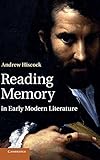Reading memory in early modern literature / Andrew Hiscock.
By: Hiscock, Andrew
Material type: TextPublisher: Cambridge, UK ; New York : Cambridge University Press, 2011Description: xi, 320 p. ; 24 cmISBN: 9780521761215 (hardback); 0521761212 (hardback)Subject(s): Geschichte 1500-1700 | English literature -- Early modern, 1500-1700 -- History and criticism | Memory in literatureDDC classification: 820.9/358 LOC classification: PR 428 | .H57 2011Other classification: LIT004120 | HI 1115 | HI 1161 Online resources: Cover image
TextPublisher: Cambridge, UK ; New York : Cambridge University Press, 2011Description: xi, 320 p. ; 24 cmISBN: 9780521761215 (hardback); 0521761212 (hardback)Subject(s): Geschichte 1500-1700 | English literature -- Early modern, 1500-1700 -- History and criticism | Memory in literatureDDC classification: 820.9/358 LOC classification: PR 428 | .H57 2011Other classification: LIT004120 | HI 1115 | HI 1161 Online resources: Cover image | Item type | Current location | Collection | Call number | Status | Date due | Barcode |
|---|---|---|---|---|---|---|
| Books | KISAJU MAIN CAMPUS - Reserve Collection | Reserve/Short Loan | PR 428 .H57 2011 (Browse shelf) | Available | 2021-0004 |
Includes bibliographical references and index.
Machine generated contents note: Introduction: 'the dark backward and abyss of time'; 1. 'To seke the place where I my self hadd lost': acts of memory in the poetry of Henry Howard, the Earl of Surrey; 2. 'Remembre not (lorde) myne offences': Katherine Parr and the politics of recollection; 3. 'Better a few things well pondered, than to trouble the memory with too much': troubling memory and martyr in Foxe's Acts and Monuments; 4. Text, recollection and Elizabethan fiction: Gascoigne, Nashe, Deloney; 5. The doleful Clorinda? Mary Sidney, Countess of Pembroke, and the vocation of memory; 6. 'Tell me, where all past yeares are': John Donne and the obligations of memory; 7. 'Of all the powers of the mind [...] the most delicate and fraile': the poetry of Ben Jonson and the renewal of memory; 8. 'This art of memory': Francis Bacon, memory and the discourses of power.
"'He who remembers or recollects, thinks' declared Francis Bacon, drawing attention to the absolute centrality of the question of memory in early modern Britain's cultural life. The vigorous debate surrounding the faculty had dated back to Plato at least. However, responding to the powerful influences of an ever-expanding print culture, humanist scholarship, the veneration for the cultural achievements of antiquity, and sweeping political upheaval and religious schism in Europe, succeeding generations of authors from the reign of Henry VIII to that of James I engaged energetically with the spiritual, political and erotic implications of remembering. Treating the works of a host of different writers from the Earl of Surrey, Katharine Parr and John Foxe, to William Shakespeare, Mary Sidney, Ben Jonson and Francis Bacon, this study explores how the question of memory was intimately linked to the politics of faith, identity and intellectual renewal in Tudor and early Stuart Britain"--Provided by publisher.


There are no comments on this title.